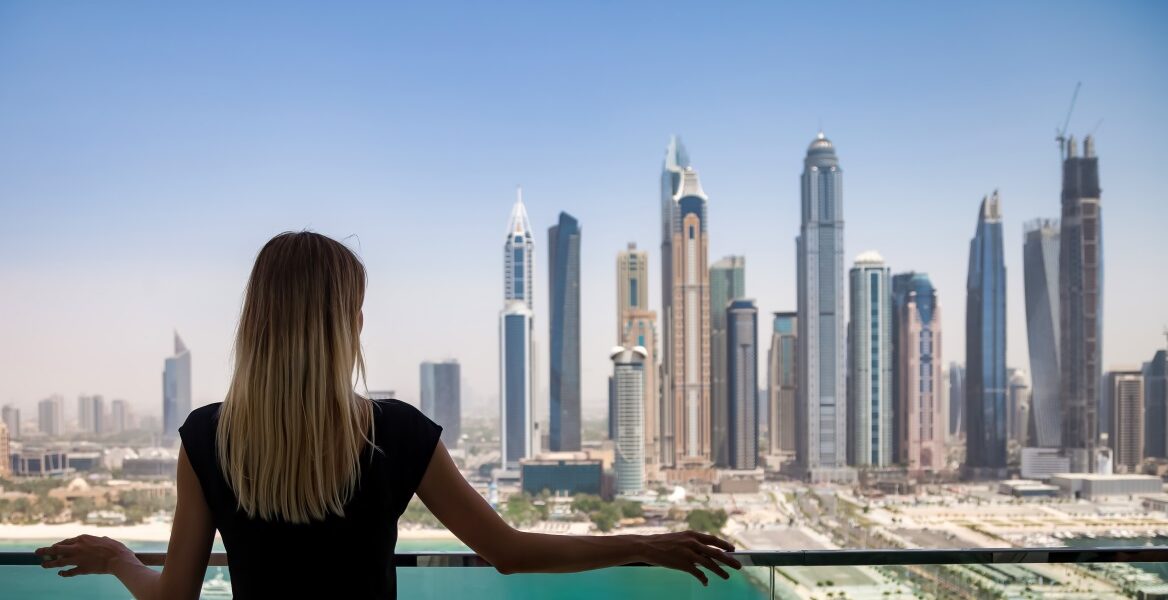Meet the Greek architect who participated in constructing Qasr Al Watan and the Dubai Opera.
The distinguished Greek architect Despina Tabakopoulou has participated in important projects in the United Arab Emirates, such as the Dubai Opera, and was the director of construction and project management for the company RMJM, having under her supervision iconic projects, such as the UAE Pavilion, the Emirates Airlines pavilion for Expo 2020, the construction of the Holiday Inn hotel in Dubai South, and other major projects.

In 2021, she created the TTZ construction company in Dubai with two other Greek architects, Sotirios Tsoulos and Philippos Zannettos. Having already spent 11 years in the country, she considers the Emirates her second home.
Tabakopoulou first travelled to Dubai in 2013 for an interview "for a big project" without knowing what it was. When the time came for the interview, she was informed that she had been invited to participate in constructing the presidential palace in Abu Dhabi.
Since then, one project has followed another, and the experiences she gained have given her a high level of technical knowledge, something she could not have achieved if she had remained in Greece.
"I participated in the construction of these projects, not in the design as a member of wider teams, but always in key positions and having great responsibility, as possible mistakes in the construction of such buildings cost millions, and we were there to correct the mistakes of the designers. The implementation engineers are always the gatekeepers of the project," said the Greek architect to Proto Thema.

To add: "A very important issue I had to deal with was my presence as a woman on construction sites, in big and serious councils, where I had to say and pass my point of view. In some, I was the only woman participating. But when you are a proper professional, you can and do earn respect."
Projects in the Emirates run at a breakneck pace as the necessary financing is in place, so delays in implementation are usually limited. An important role is also played by the clauses that exist towards the contractors from the developers who, in order to achieve their financial goals, set non-negotiable strict programs, while in case of delays, there are very serious penalties for the contractor.
"Therefore, it is almost guaranteed that a project will be finished on time or with very little delay," the architect explained.
In recent years, despite the turmoil at the international level, the war in Ukraine, and the war between Israel and Hamas, the Emirates continues to be an attractive destination for real estate investors. A record 431 homes were sold in Dubai last year, with the majority of buyers being Russians.
There was also a notable increase in buyers from Egypt, Lebanon, Pakistan, and Turkey, as Dubai is considered a safe haven for buyers. Lately, several Greeks have shown interest. According to Despina Tabakopoulou, these are obviously people with a financial background but also with investment insight who want to expand their investment portfolios.
"They are mainly interested in the properties with the highest ROI (Return on Investment) to ensure the greatest return on their investment," added Evita Eleftheroudaki, the owner of Epsilon Team and a colleague of Ms. Tabakopoulou in Greece.
The incentives for buying property in Dubai are guaranteed returns, tax-free, speed in buying, selling, and renting properties, and the eventual acquisition of a golden visa, which ensures a 10-year visa for property owners.

"Where do you come from?"
And if "where do you come from" is necessary for purchase and sale in Greece and in general in the EU, in Dubai, it doesn't even exist as a concept, said the Greek architect.
There are clear procedures for transferring money abroad, but these are simpler and governed by the UAE's foreign investor-friendly central bank.
There are huge differences in real estate prices with respect to location. For example, an apartment in a financial district of Dubai with three bedrooms starts from 350,000 euros to 400,000 euros, while prices for luxury villas start at 600,000 euros.
"Some villas that we have recently designed start from 1,500,000 euros and reach 11,250,000 euros," said Tabakopoulou.
Regarding the strong rumour that Dubai is going through the last two years of a real estate boom, the Greek architect estimates that the events of 2008 will not be repeated as the Emiratis have learned their lesson and implemented measures.
"We are clearly in a more mature phase of the Emirati economy, as we see that taxation is gradually coming in," she said.
"This year is the first year that we have the corporate tax application, which was zero until last year. We also have to consider that Dubai's economy relies predominantly on foreign investors in terms of real estate and that the war in Ukraine has contributed significantly to the influx of capital into the country, and there are still flows," Tabakopoulou explained.
"Real estate prices are still moving upwards, and despite everything, there are still many opportunities for profitability in the so-called off-plan, in the land market, and also in slightly older properties in good condition with the addition of renovations," concluded the Greek architect.
Frixos Drakontides is a columnist for Proto Thema. Translated by Paul Antonopoulos.
READ MORE: Ellinikon: Europe's Largest Smart City Built in Greece.


